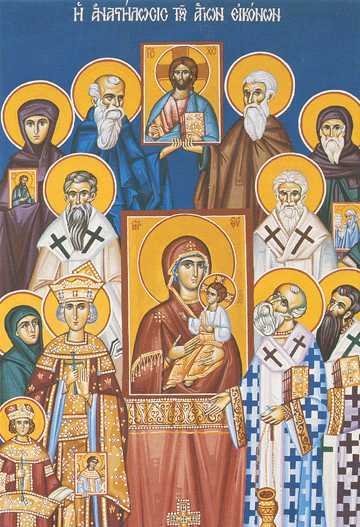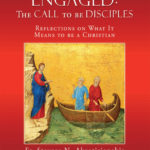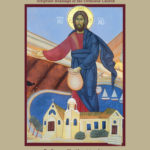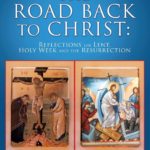Sunday Epistles & Gospels
Sunday of the Seventh Ecumenical Council
The Parable of the Sower

The Parable of the Sower
Gospel Reading for the Sunday of the Seventh Ecumenical Council
Luke 8:5-15
Jesus said this parable,
“A sower went out to sow his seed; and as he sowed, some fell along the path, and was trodden under foot, and the birds of the air devoured it.
And some fell on the rock; and as it grew up, it withered away, because it had no moisture.
And some fell among thorns; and the thorns grew with it and choked it. And some fell into good soil and grew, and yielded a hundredfold.”
And when His disciples asked Him what this parable meant, He said,
“To you it has been given to know the secrets of the kingdom of God; but for others they are in parables, so that seeing they may not see, and hearing they may not understand.
Now the parable is this: The seed is the word of God. The ones along the path are those who have heard; then the devil comes and takes away the word from their hearts, that they may not believe and be saved.
And the ones on the rock are those who, when they hear the word, receive it with joy; but these have no root, they believe for a while and in time of temptation fall away.
And as for what fell among the thorns, they are those who hear, but as they go on their way they are choked by the cares and riches and pleasures of life, and their fruit does not mature.
And as for that in the good soil, they are those who, hearing the word, hold it fast in an honest and good heart, and bring forth fruit with patience.”
As He said this, He cried out, “He who has ears to hear, let him hear.”
When I was a young priest, I said to my Spiritual Father one day that I was getting frustrated because I didn’t see quick results from my work. I guess I expected to give sermons and see people running up to me and saying “Father, I finally get it.” When I didn’t get this, I quickly got discouraged. My Spiritual Father said to me:
Imagine that you have a big bag of seed. Every day you get up and walk down a path and throw the seed. You don’t get to turn around and see if the seed grew. You don’t even get to walk down the path again.
Every night, when you are tired, you put the bag down and sleep, and the next day you get up and start throwing the seed again.
Your job is to throw the seed; not watch it grow. If you take comfort in doing your job, you will be a lot more fulfilled. Just throw the seed; that’s all God expects.
He was right. I now focus on throwing the seed, and not whether it grows. And the reason is because the seed can only grow in the fertile soil of a good heart. I can’t control hearts, only throwing seed into them.
I’ve learned over the years that my job is to create an environment which encourages people to grow in their faith. I can’t control the people growing in their faith, but I can control the environment I create. This is true not just for priests, but for many people. Parents create an environment which encourages their children to grow in faith, responsibility, maturity, and fun. Teachers create an environment that encourages learning. Doctors and nurses create an environment that encourages healthy living. Let’s say I am sick and go to the doctor. The doctor prescribes medication so that I can be healed. If I don’t take the medication and don’t get healed, that is not the doctor’s fault. The doctor can’t make me take the medication. The doctor can create the environment (in this case the proper prescription) which encourages healing. The healing in this case, rests on me, the patient, to follow the prescription.
We’d probably all be a lot more satisfied in our jobs if we focused on creating environments that encourage things, rather than focusing solely on results. This is one practical application of this morning’s Gospel.
The analogy of the seed and the sower is really applicable to the world today. The seed, as Jesus says, is the word of God. Each of us has the word of God sown into the soil of our hearts—at baptism, each Sunday at the Liturgy, and on our own in prayer. Some hearts are like the path—they have no dirt, no depth of spirituality. This analogy reminds me of the people who receive the seed at baptism and never really attend church — the seed never takes root.
Some hearts are like rock. They receive the word of God, but there is no moisture, no love, no compassion; and so the seed doesn’t grow.
Many hearts are like the thorns—They receive the word of God with great joy, but in times of temptation, they fall away. I feel like I am in this category at times. The Christian faith brings me great joy. But then in time of temptation, or even busy-ness, I “fall away.”
Ideally, our hearts have good soil. They hear the word of God, accept it, internalize it, and live it. And from them, the Word spreads to others, it yields some results. In order to cultivate good soil, we need patience, we need consistency. This is why we pray often, why we worship, why we read scripture and why we seek to live out the Christian life on a daily basis. These things grow and make fertile the soil in our hearts.
God has put His seed, His Word in us. He expects a return on His “investment” in us. Ideally His Seed in us should yield a “one hundredfold return.” Likewise, when we invest ourselves in God, we also hope for a return, eternal life. When our soil yields a positive return, we are well on our way there.
There is one more lesson from today’s parable, which comes from Luke 8:9-10. When the disciples asked Jesus what the parable meant, He answered them, “To you it has been given to know the secrets of the kingdom of God; but for others they are in parables, so that seeing they may not see, and hearing they may not understand.”
A parable is a story with a hidden meaning and a life application. The “secrets” or “mysteries” (The Greek word in Luke 8:10 which is translated as “secrets” is “mysteries” which is the same word we use in the Orthodox Church for sacraments. We call the sacraments the “mysteria,” or “mysteries.”) of God are revealed to us in prayer and the sacraments. There are many who “see but do not see,” who “hear but don’t understand.” To the person who has never attended the Divine Liturgy, as an example, they see an elaborate production, a priest wearing vestments, an ornate church, altar boys milling around, and a choir singing. However, to the devout worshipper, the Divine Liturgy is the Kingdom of God revealed in the here and now. This is why the Divine Liturgy is the ultimate parable. Prayer is also a parable. To the person who does not pray, prayer seems to be a person talking to himself or herself. To the person who is fervent in prayer, prayer is spiritual intimacy with God.
How we experience prayer, Liturgy and the other mysteries of God depends on the soil we are cultivating in our hearts. The soil in our hearts is cultivated through patience, consistency, and being in an environment that encourages good soil—personal prayer and study, and belonging to an encouraging church community. It is also cultivated through a disciplined life that doesn’t allow the thorns and cares of life to choke it out.
Going back to the beginning of this reflection, creating an environment in your life that helps you receive the seed and grow it will allow the seed to grow in you. Throwing the seed to others, regardless of whether it grows or not, is part of our role as Christians. We are to be cultivators of seed, as well as sowers. First we cultivate, then we sow. And if we are giving our best to do both, this is what pleases God. For He crowns not success, but effort.
From the Praises of the
Sunday of the Seventh Ecumenical Council

Translated by Fr. Seraphim Dedes
When the holy Fathers had assembled all of the science of the soul, with the divine Spirit they exampled all things synodally, and inscribed the divine and all-blessed Symbol, as if God Himself had written it.
Therein they lucidly and most truly teach that the Logos is, without beginning and of one essence with the One who engendered Him.
Teaching thus, these famous and truly happy godly-minded men are clearly faithfully following that which the Apostles taught.
Seek environments that encourage you to grow in your faith. Create environments that encourage others to grow in theirs. +Fr. Stavros
This article was originally published on October 15, 2017
Books by Fr. Stavros N. Akrotirianakis
#gallery-5 {
margin: auto;
}
#gallery-5 .gallery-item {
float: left;
margin-top: 10px;
text-align: center;
width: 33%;
}
#gallery-5 img {
border: 2px solid #cfcfcf;
}
#gallery-5 .gallery-caption {
margin-left: 0;
}
/* see gallery_shortcode() in wp-includes/media.php */
- “Engaged: The Call to Be Disciples” by Fr. Stavros Akrotirianakis
- “Blessed Is the Kingdom, Now and Forever” by Fr. Stavros Akrotirianakis
- “Let Us Be Attentive” by Fr. Stavros Akrotirianakis
- “The Road Back to Christ” by Fr. Stavros Akrotirianakis
- “Let All Creation Rejoice” by Fr. Stavros Akrotirianakis
With Roger Hunt providing today’s Daily Reading: Listen Now.
These readings are under copyright and is used by permission. All rights reserved. These works may not be further reproduced, in print or on other websites or in any other form, without the prior written authorization of the copyright holder: Reading © Holy Transfiguration Monastery – Brookline, MA, Apolytikion of Abbot Marcellus © Narthex Press, Kontakion of Abbot Marcellus © Holy Transfiguration Monastery – Brookline, MA.
The Revised Standard Version of the Bible is copyrighted 1946, 1952, 1971, and 1973 by the Division of Christian Education of the National Council of the Churches of Christ in the U.S.A. and used by permission. From the Online Chapel of the Greek Orthodox Archdiocese of America.
Podcast: Play in new window | Download







0 Comments